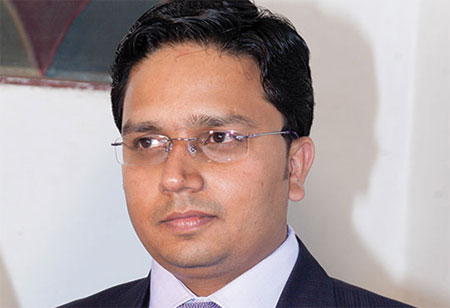It’s Not Only About Managing the Triple Constraints
By Palash Gupta, PMP, PgMP - Head Project Management Center of Excellence,
Huawei Technologies India

Palash Gupta, PMP, PgMP - Head Project Management Center of Excellence, Huawei Technologies India
Few decades back, project management was mostly a tactical endeavor deployed in construction engineering and technology, focused on technical tools such as WBS, EVM, Gantt charts and success was measured in - On time, on budget, and on scope metrics.
Fast forward a couple of decades and now Billions of dollars riding on projects with project management deployed in almost every industry touching each function. Modern world PM is perceived as both a creator of business value and a driver of a results oriented framework.
Moving forward to the world full of robotics & automation, concerns have been raised on the relevance and future of Project Management profession, I am putting an attempt to pen down 5 interconnected dots for today’s PMs to be a relevant force for the business success.
Create Strategic Equity
Once viewed as mere organizers or administrators current world PMs are expected to be strategic thinkers who play a vital part in delivering change. As organizations flatten, there is a rising need for more people to think strategically on behalf of the entire enterprise. Project management is no longer just about managing the triple constraints, but rather delivering the business benefits, value to the customer and wealth to the bottom line. In a nutshell, As a project Manager, one is advised to “Identify how his project is expected to add to company's efficiency and competitiveness as a whole”. This requires evolving from project managers to profit managers, accountable for project's financial performance, benefits realization, and its impact on the organization's bottom line.
New PMI Talent triangle reflects the emerging aspects of the PM Trend and the PM skills -
Embracing VUCA
Historically project is considered to have a definite scope, predefined deliverable and PM having the responsibility of controlling the change. In current complex world, PM is increasingly required to identify, interpret and diagnose the missing and incomplete information about projects, people and relationships to break down complexity into manageable pieces. In a world full of VUCA it is imperative to make decisions, plan forward, manage risks, foster change and solve problems.
Very frequently we use the Quote “CHANGE IS THE ONLY CONSTANT”, but in real life Inertia plays its role and we fall in love with our project plan resisting any change. It reminds me the quote, “One can’t chase the Dog with a Train, - When the business environment is ever changing the plan can’t be static one”. Today’s PM is not responsible for preparing a onetime baseline Project Plan but more responsible for the Planning! Continuous & Adaptive Planning! Planning like a guided missile, which senses the environment, make mid-course adjustments to steer and hit a moving target.
A layered approach of Strategic, Tactical and Operational plans need to be executed with maximum agility. Adjustments, adaptations and unexpected decisions must be made along the road to project completion.
Up Skilling & Cross Skilling Self
Strategy execution requires up skilling to meet the demands of today's marketplace. PMs must have a multidisciplinary skill set that includes effective communications skills, analytical thinking, strategic initiative, a business mind-set, economics knowledge, and technical finesse. A PM is expected to acquire the cognitive abilities to internally and externally diagnose a business situation and provide reconciliatory recommendations supported by complex domain specific data.
PMs need to apply Design thinking principles on problem solving through innovative solutions by drawing on approaches from engineering and design and combining them with ideas from the arts, social sciences, and the business world. For PMs, it's particularly significant for exploring and then narrowing the scope of requirements to generate a non-typical solution. Sounds contradictory but emotionally quotient will become increasingly important in the environment full of robots.
Delivering The Right Product
Portfolio and program management (PPM) is a key element in successful strategic execution, ensuring projects, programs and portfolios align to the organizational strategy and delivering the consolidated benefits. Organization PPM structure need to keep pace with market velocity and shifting organizational priorities. A TOP down PPM model needs to be complimented by a bottom-up process that continually links project outcomes with organizational strategy to eliminate risk of delivering useless project outcomes. Same time it is imperative for all three layers to blur their boundaries to understand each other’s priorities and constraints.
Ethics are Ethics
Statistics over the last 5 years tells that ~45-60 precent projects achieve the initial goals set for business, budget and time. Surprisingly number of certified project managers has double in similar duration. Does this mean a lack of positive correlation between the increase in professional proficiency and the project success?
This phenomenon can be explained by a simple analogy in our day-day experience on Bangalore roads - “Most of the urban commuters know the traffic rules and hold a driving license but one of the major reasons for traffic jams is violation of traffic rules due to lack the driving sense”. Similarly, In addition to other reasons one important factor contributing to project failures is lack of ethical and moral considerations.
It may sound harsh but, How many of us underestimate the project cost/effort, inflate the relevant experience or available skill set to please our management or to win a contract; As a PM many of us have found an easy way to handle a demanding management and a mistrustful/unrealistic client by over committing and ignoring the risks.
From 1984, Union Carbide Corporation (Bhopal gas tragedy) to 2010, Deepwater Horizon Oil Spill (BP oil spill) till the recent Volkswagen emissions scandal there is a common cause of failure.
When other vested priorities or interests get preference over the project management principles it causes the historical blunders like-Space Shuttle Challenger disaster. Message is loud and clear - “How much ever we ignore the environment, The Nature can’t be fooled”.








